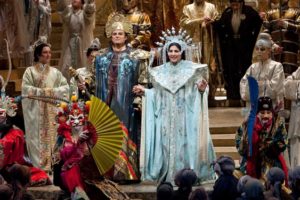

I have seen every role (other than an early Zerlina and Musetta) she has sung in her nearly 13 years at the Met, but I admit to having always been a somewhat ambivalent Netrebko-watcher (and -listener). Some performances I’ve enjoyed more than others, yet other than a concert with the Mariinsky Opera a few years ago at the Kennedy Center where she was exquisite in the great Iolanta duet, I’ve never really “gotten” the mystique that has made her opera’s biggest star—until the other night, that is.
Bolting upright in bed clad only in a clingy grey slip and rocking glamorous blonde tresses, Netrebko launched into her opening scena with all guns blazing and then never let up the sizzling intensity all evening.
During the single intermission I recalled the doubters who had forecast disaster when she announced her intention to take on Verdi’s malevolent anti-heroine. Shouldn’t she should be sticking to the Trovatore Leonora (with which she recently triumphed at the Salzburg Festival) or taking on Desdemona or Luisa Miller?
Based on an in-house recording of her first attempt this summer in Munich, the naysayers might have had a point: it was a bold but somewhat tentative Lady. At the Met, though, she was transformed. Wednesday she bit into Piave and Maffei’s text with a specificity and relish that was startling, particularly as previously I had often found her use of words disappointingly lax. While the top of the voice gleamed as always, there was a new, pungent strength to her dark middle and lower voice coupled with unusual care over dynamics, particularly in the arresting, hushed act I conspiratorial duet with her balking husband.

After dominating the opera’s first half (acts I & II), Lady Macbeth has rather less to do until the sleepwalking scene, which here seemed still a work-in-progress. At this point Adrian Noble’s staging does its soprano no favors: there’s lots of distracting business with chairs and that recurrent swinging lamp but Netrebko gamely negotiated it all, but there was less of the guilt and regret than one wanted. I expect as the run progresses Netrebko will find more depth and nuance in this haunting “mad scene,” and one hopes that she will be able to fine down her final high D-flat to the fil di voce Verdi requested.

Perhaps ignited by the potent strength of his stage wife, Lu?i? drew a powerful portrait of the conflicts inside Macbeth from his frightening breakdown at the banquet to the resignation of “Pietà, rispetto, amore.” Although the tone can be a little grey, the aria was sung with an impressively flowing legato earning an ovation equal to those awarded earlier to his more famous consort.

Always a fine Verdi conductor, Fabio Luisi proposed a swift, biting view of this Shakespearian adaptatio,n eliciting precise, alert playing from his orchestra and providing admirable support for his hard-working cast. Not inclined to linger, he did surround his Lady with the subtle, eerie accompaniment suited to her restless night. Although the ladies of the chorus sounded in uncharacteristically raw form, the men thundered resoundingly and together with Luisi helped build the thrilling act I concertante to an overwhelming conclusion. Another of the evening’s high points came in the chorus’s affecting rendition of “Patria oppressa” where the Scottish refugees mourn their tragic displacement.

So, on its third try, the Met has its first hit of its nascent season. Although it may not reveal the riches of his later Shakespeare operas Otello and Falstaff, Verdi’s early masterpiece is always compulsively entertaining and this thrilling revival instantly became this fall’s essential viewing, either at its six remaining performances or at its HD transmission to theaters worldwide on October 11.
Christopher Corwin is the reviewer formerly known as DeCaffarrelli.
Photos: Marty Sohl/Metropolitan Opera.























Comments